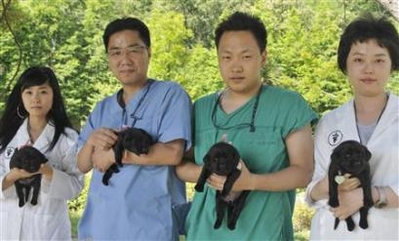A South Korean biotech firm announced it has successfully cloned four dogs capable of sniffing out human cancers by using tissue from a Labrador retriever in Japan, media reported Wednesday.
RNL Bio, a leader in commercializing cloning in South Korea, said Monday the dogs were born last month and would be sent to Japan for training in the same skills as their mother.
Two of them will later be sold to clients at 500 million won (US$480,000) each or more, it said.

Lee Byung-chun (2nd L), a professor at Seoul National University's school of veterinary medicine, poses with his assistants and the four cloned puppies at his laboratories in Seoul June 16, 2008. (photo: Xinhua/Reuters)
The cloning, requested by the Japanese stemcell company Seems, was conducted by a team led by Seoul National University professor Lee Byeong-Chun and has been verified by the medical school.
The puppies were cloned from Marine, a six-and-a-half-year-old dog which is unable to give birth to siblings following an operation to have her womb removed.
"Thanks to the cloning technology, it (Marine) has been able to preserve its own genes," said a statement on RNL Bio's website.
Researchers in several countries are investigating whether dogs have the ability to detect lung, breast, prostate and skin cancer at an early and treatable stage.
They believe cancer cells create a scent not present in healthy cells, which can theoretically be picked up by dogs in breath or urine samples.
(Agencies via Xinhua June 18, 2008)